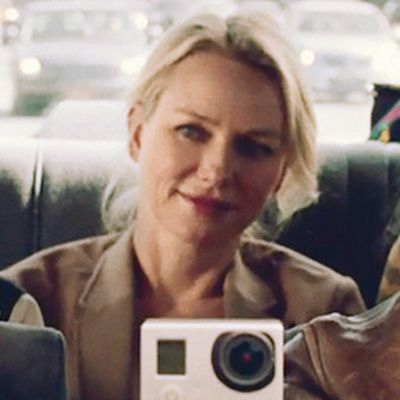
In While We’re Young, writer-director Noah Baumbach gets hold of a good satirical premise and does halfway well by it, maybe even two-thirds. His protagonists are sad 40-somethings Josh (Ben Stiller) and Cornelia (Naomi Watts), who can’t have kids and grow increasingly alienated from their child-centric friends, but who meet a pair of 20-something hipsters, Jamie (Adam Driver) and Darby (Amanda Seyfried), and discover an exhilarating new design for living. Josh and Cornelia are dimly aware — especially at first — of how ridiculous they look trailing breathlessly behind flaky kids 20 years their junior. But they’re invigorated by the company and elated by the sudden sense of what’s possible. For much of the film, the often-bilious Baumbach stakes his claim on the wobbly-but-fertile border between mockery and sympathy. He seems to have found his inner Paul Mazursky, the satirist who can poke fun at his characters’ foolish self-delusions without delivering the killing blow.
He has certainly found his perfect fool in Stiller, an actor for whom unease, shame, and paranoia seem second nature. That made him too on the nose as Baumbach’s malcontent Greenberg and too much of a stretch as a lovable little man with big dreams in his own The Secret Life of Walter Mitty. But Josh is in Stiller’s sweet spot; he’s just the right mix of hope and worry. As a filmmaker who has spent the last decade editing a political documentary about … something lefty, I never understood the premise, Josh is both righteous and indecisive; he can’t get into a groove because no groove can accommodate his zigs and zags. He’s a billboard for pained inertia.
Josh is flattered when Jamie — himself a filmmaker — pops up at one of his sparsely attended extension-school lectures and goes on to enthuse over an early, obscure doc of his, and more flattered still when Jamie welcomes him into a world of bohemian adventurers with retro passions like vinyl records, board games, and shamanic circles. Josh is even flattered when Jamie begins calling him “Yosh,” which is where any self-respecting person would draw the line. We see the appeal: Jamie is like a younger, stretched-out Josh, still wide-eyed, still in Eden before the advent of shame. Though Cornelia doesn’t have her husband’s back-to-the-garden vision, she’s equally desperate for refuge, her spirit broken by contemporaries who coo over infants and gaze on her with a peculiar mixture of pity and resentment.
While We’re Young has an agreeable hubbub, like Woody Allen’s recent talk-fests but looser and less thesis-driven. The movie shows off Baumbach’s often marvelous ear for the self-congratulatory language of closed ecosystems, the banter that makes insiders feel special while inducing existential panic in typical Baumbach protagonists, who can’t seem to pick up the code. Josh and Cornelia are so desperate to enter Jamie and Darby’s world that they forsake a country weekend with grown-ups for a druggy vision quest (“Breathe in light, breathe out darkness”) in which participants struggle to express deep thoughts, vomit into buckets held chest-high, and calmly resume speaking, unfazed by the high ratio of puke to insight. It’s obvious that Josh and Cornelia will never fit in, but we love them for trying. And we love Jamie and Darby, too, for opening up their world — and offering to collaborate on a documentary — with no ulterior motive.
Until, that is, an ulterior motive presents itself, and the familiar chip on Baumbach’s shoulder reasserts itself with a vengeance. (Or was it always there, under wraps?) Maybe the movie’s pretentious opening should have been a tip-off: a snatch of dialogue from Ibsen’s The Master Builder, in which 20-something Hilda Wangel exhorts the aging title character, Halvard Solness, not to fear the knock of youth on the door but to “open it and let them in.” If you don’t know the play, Hilda is the embodiment of youth who urges the master builder to climb to the top of a steeple and becomes semi-orgasmic as he plummets to his death. Nobody dies in While We’re Young, but a lot of illusions are bashed against the pavement. As the melodrama kicks in and Josh begins to rail about documentary ethics, we’re suddenly in a universe of liars, opportunists, and people who want what’s ours. Only the motives of Baumbach’s alter ego are pure. Meanwhile, the most entertaining questions — Can people transcend wide age gaps? Should they want to? — turn out to be beside the point.
Though Stiller and Driver are better in the first half, the four leads remain excellent; Maria Dizzia and Adam Horovitz (as Josh and Cornelia’s baby-bound best friends) have their moments; and there’s a funny scene in which Josh pitches his unending documentary to a hedge-fund manager who doesn’t so much say no as slowly withdraw into the ether, unable to recognize that what’s coming out of Josh’s mouth are words. But the movie is a long anticlimax. The biggest disappointment is the role that Baumbach wrote for Charles Grodin — his juiciest in many years but with only one or two laugh lines. If nothing else, I wanted Grodin to kick Stiller’s butt across the screen for desecrating the name of The Heartbreak Kid.
*This article appears in the March 23, 2015 issue of New York Magazine.


